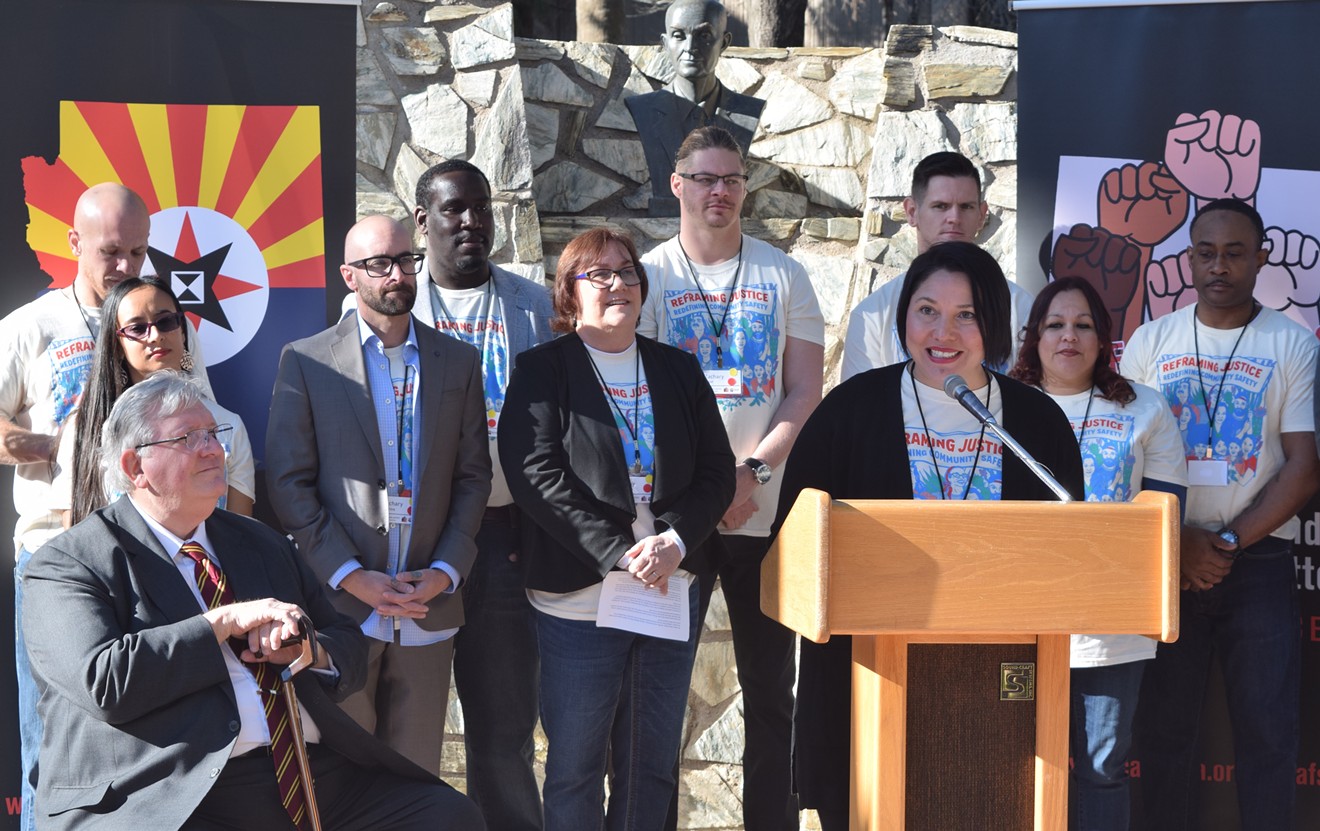In spite of bipartisan support, recent legislation in the U.S. Congress, and a concerted effort from advocates, the outlook for ambitious criminal justice reform at the Arizona Legislature has turned grim.
Significant reform bills that sought to give incarcerated people an opportunity for an early release, and allow judges more leeway to ignore mandatory minimums, are effectively dead.
Last week was the Arizona Legislature's deadline for committees to approve bills in their chamber of origin. But the House Judiciary Committee, chaired by GOP Representative John Allen, did not grant a hearing to several significant criminal justice bills, frustrating supporters.
Caroline Isaacs, the Arizona program director for the American Friends Service Committee, said that although the bipartisan consensus on the need for reform gives them hope, in reality, there are "obstructionists" at the Arizona Capitol.
"That's a very difficult problem to have given the way that our system works," Isaacs said. "There is an incredible amount of power vested in committee chairs, and sometimes they choose to wield it in these ways."
In light of the bipartisan push for criminal justice reform at the federal level and with key Republican legislators on their side, advocates like Isaacs hoped that Arizona finally might act to lower the state's incarceration rate, which ranks as one of the highest in the country, reducing the state's $1 billion corrections budget in the process.
Last month, criminal justice reform advocates with the AFSC gathered at the Arizona Capitol to share an optimistic vision. During the new legislative session, lawmakers had the opportunity to pass meaningful criminal justice reform, they said during the news conference.
Yet the House Judiciary Committee did not hear two significant Republican-sponsored criminal justice reform bills favored by the AFSC.
One bill from Republican Representative Walter Blackman, HB 2270, would have allowed incarcerated people to earn an early release from prison if they are enrolled in an eligible work or education program. Currently, Arizona inmates must serve 85 percent of their sentences under the state's so-called truth-in-sentencing law, which passed in 1993.
Another far-reaching bill sponsored by Representative Tony Rivero, HB 2245, would have given judges some discretion to ignore a mandatory minimum sentence for defendants – excluding offenses involving physical injury, a criminal enterprise, or sex offenses against minors.
The substance of these bills could still pass in what is known as a strike-everything amendment. However, without significant support from the GOP leadership, the legislation is unlikely to get a hearing on the floor.
In an op-ed for the Arizona Mirror earlier this month, Judiciary Committee member Kirsten Engel, a Tucson Democrat, criticized Allen for blocking much-needed criminal justice legislation. Unless he scheduled the bills for a hearing before the deadline, she wrote, "the will of the voters to take up criminal justice reform will be thwarted for yet another year."
Allen didn't budge. The deadline passed, with no action from his committee on the major reform bills.
Recent studies examining Arizona's bloated and expensive prison system have added to the call for reform.
Arizona has the fourth-highest incarceration rate in the country, according to a study by the pro-reform lobbying organization FWD.us. And last fall, the Arizona chapter of the American Civil Liberties Union produced a report that showed one in five inmates in Arizona are incarcerated because of drug-related offenses. The ACLU also found Latinos are disproportionately represented among Arizona's prison population; the state has the highest incarceration rate for Latinos in the U.S.
Nevertheless, the current legislative session is not the first time that criminal justice reform efforts have stalled.
According to advocates, the powerful Republican county attorneys Bill Montgomery of Maricopa County and Sheila Polk of Yavapai County have been known to throw their weight around at the Legislature, though they rarely reveal their efforts publicly.
Isaacs laughed when asked if she has any evidence that the prosecutors have leaned on legislators this session to stymie reform.
"These are very sophisticated political operatives," Isaacs said. "They know better."
Marilyn Rodriguez, a lobbyist with Creosote Partners who represents the reform-minded Arizona Attorneys for Criminal Justice, said county attorneys like Montgomery add to the problem of bills getting through the committee "chokepoints."
"Prosecutors continue to engage behind the scenes to slow or halt any progress," Rodriguez said.
One bill that has advanced with the support of the Maricopa County Attorney's Office is SB 1310, a less far-reaching version of Blackman's earned-release credit bill. Unlike Blackman's proposal, the version supported by Montgomery and sponsored by Senate Judiciary Committee Chair Eddie Farnsworth would only affect inmates convicted of possession or use of marijuana or narcotics.
The full Senate is scheduled to vote on SB 1310 on Wednesday.
Advocates of reform are unimpressed by the measure: Rodriguez called the bill "phony." Isaacs referred to the bill as a "red herring" and said the measure would "barely have any impact at all."
"It's really just for drug-possession offenses, which in many people's minds should not be felonies at all," Isaacs said. "Nobody should be serving prison time for possession of [a] small amount of drugs."
A request for comment to Montgomery regarding his involvement in criminal justice reform at the Legislature was not returned.
Isaacs said she remains optimistic about the legislation that has survived the committee process, such as a bill treating undesignated felonies as misdemeanors unless a court specifies otherwise.
Another bill moving ahead proposes decriminalizing needle exchanges for people struggling with addiction. Last year, a version of the bill passed in the House but failed to muster enough votes to receive the approval of the whole Legislature.
Rodriguez took the long view. She recalled legislative sessions in years past where similar reform bills would never see the light of day.
Just last year, she said, advocates were forced to fight to kill a bill that would have created mandatory minimum sentences for anyone convicted of manufacturing or selling fentanyl, or possessing the equipment to do so.
“Now we’re fighting proactive fights," Rodriguez said.
[
{
"name": "Air - MediumRectangle - Inline Content - Mobile Display Size",
"component": "18478561",
"insertPoint": "2",
"requiredCountToDisplay": "2"
},{
"name": "Editor Picks",
"component": "16759093",
"insertPoint": "4",
"requiredCountToDisplay": "1"
},{
"name": "Inline Links",
"component": "17980324",
"insertPoint": "8th",
"startingPoint": 8,
"requiredCountToDisplay": "7",
"maxInsertions": 25
},{
"name": "Air - MediumRectangle - Combo - Inline Content",
"component": "16759092",
"insertPoint": "8th",
"startingPoint": 8,
"requiredCountToDisplay": "7",
"maxInsertions": 25
},{
"name": "Inline Links",
"component": "17980324",
"insertPoint": "8th",
"startingPoint": 12,
"requiredCountToDisplay": "11",
"maxInsertions": 24
},{
"name": "Air - Leaderboard Tower - Combo - Inline Content",
"component": "16759094",
"insertPoint": "8th",
"startingPoint": 12,
"requiredCountToDisplay": "11",
"maxInsertions": 24
}
]












